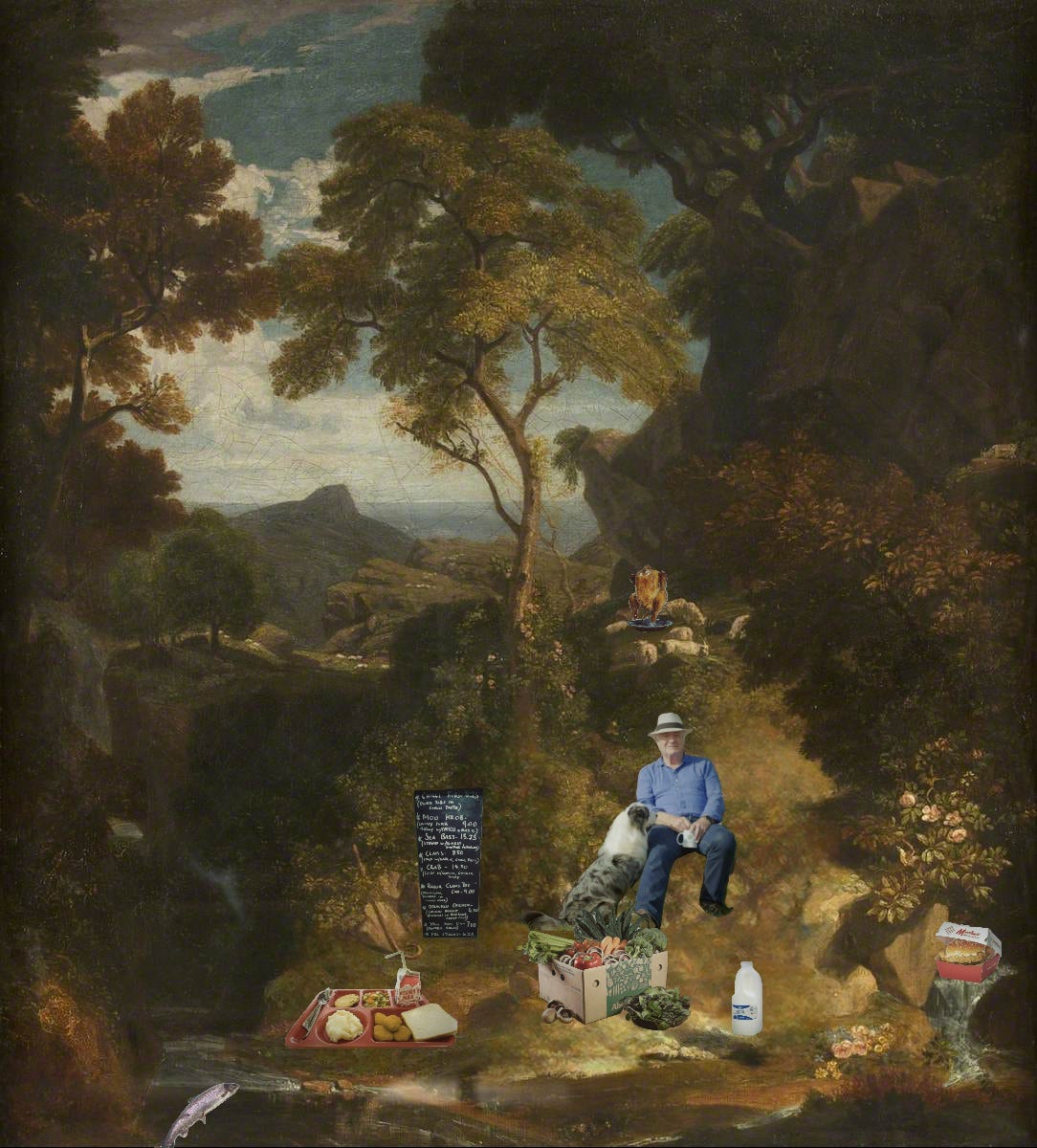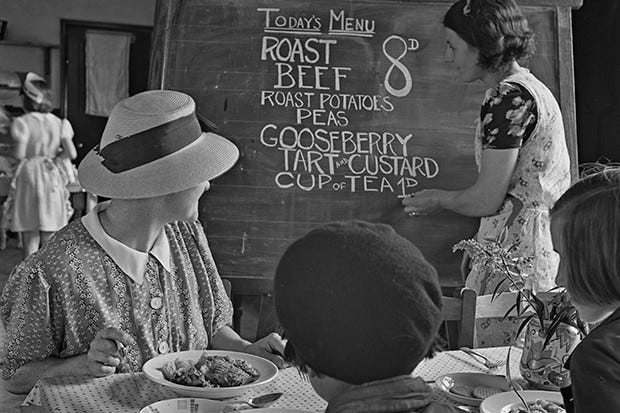How would you improve food in the UK?
We asked writers, activists and politicians for practicable policy ideas to change the way food is produced and consumed in the UK.
Good morning and welcome to Vittles Season 7: Food and Policy. Each essay in this season investigates how policy intersects with eating, cooking and life. If you wish to receive the Monday newsletter for free weekly, or to also receive Vittles Recipes on Wednesday and Vittles Restaurants on Friday for £5 a month or £45 a year, then please subscribe below.
For our fifteenth newsletter in this season, we asked writers, farmers, politicians and activists for ideas for viable policies that would improve the food situation in the UK. In this compilation, Zarah Sultana, Alex Heffron, Amber Husain, Lyds Leather, Abby Rose, Pen Vogler, Dee Woods, Col Gordon. Pamela Brunton, Dr Courtney Scott, Bee Wilson and Katie Revell think about the achievable ways that our food systems could improve if the desire to change policy is there.
How would you improve food in the UK?
We asked writers, farmers activists and politicians for practicable policy ideas.
Minimum Wage Tied to Cost of Food
It feels pretty basic to suggest that the cost of food ought to be accounted for in minimum wage and benefit calculations, but this is one of the five as-yet-unmet demands of the UK Right to Food campaign. The word ‘luxury’ might still evoke saffron or salmon for some, but with the price bloat and wage stagnation of recent years, for many it has come to describe the idea of simply eating enough. Still, even if the cost of staples (where price hikes are felt most keenly) were to be factored in to our country’s smallest incomes, would that constitute the satisfaction of a ‘right to food’?
The spirit of this right derives from the dream of a society in which every person is able to feed themselves with dignity – reasonable for one of the richest countries in the world. For me, this would mean not just eating enough, but eating with freedom and delight – allowing for the exercise of cultural, political and ethical choice, but also the indulgence of whim. A fleshier version of the basic demand, then, would be to insist that those wage and benefit calculations account for the kind of culinary expenditure you’d allocate to someone you loved. Or perhaps what those who make policy would expect to spend on themselves. Amber Husain
Reform Universal Credit
The way that we eat, and our ability to engage with food as a culture, is undeniably connected to our financial income. Reforming the Universal Credit system is a means to ending the philanthropic model of food aid that currently exists in the UK. UC doesn’t currently cover an individual or family’s basic needs for an adequate standard of living – including rent, bills, and food – and threatens sanctions if people don’t accept zero-hours contracts. This perpetuates a cycle of inconsistent income, increasing household food insecurity and reliance on food aid. By excluding those seeking asylum, or who have no recourse to public funds (NRPF), from claiming UC, the hostile environment is systemically starving people.
UC needs to be increased to allow people an adequate standard of living and enable them to reject the zero-hours contracts that are forcing us into a failing gig economy. It needs to be extended to people with NRPF, and the five-week wait on UC – which purposefully exposes people to food insecurity – must be scrapped. Changing how people eat and connect to food will demand an intersection between politics, economy and culture. It’s not enough to talk about ending the need for food banks; we must also put a welfare policy in place, protecting the worker and migrant rights that allow people and communities to actively choose and participate in how they want to feed themselves. Lyds Leather
Agroecology Development Officers
In 2022, Scotland passed the Good Food Nation Act, for which all local authorities, health boards, and Scottish Ministers must now produce plans. Amongst other things, these plans must take into account environment, health, and social and economic well-being. If created thoughtfully, these plans have the potential to help kickstart transitions to agroecological food systems.
My policy change would be to create teams of Agroecology Development Officers in each region, building on the methodologies of ‘Farmer Clusters’ (where groups of farmers are facilitated to work collaboratively in order to accomplish goals they couldn’t achieve on their own) as well as the emerging frameworks of ‘Regional Land Use Partnerships’, which facilitate collaboration between local and national government, communities, landowners, land managers and wider stakeholders in order to tackle the climate and biodiversity crisis. These teams would be tasked with working with different members of the food production cycle to tackle food and land policy together, helping to facilitate the organisational and cooperative capacity on the ground. They would also help develop the appropriate infrastructure that would be required to deliver meaningful Good Food Nation plans in an agroecological way. Col Gordon
Death on the Curriculum
That death is a fundamental part of life is something many farmers inherently understand (often much better than most other people). On farms, animals die all the time. They are eaten by other animals, they fall ill or get injured, and they are killed so that we can eat them. Yet one of the thoughts prompted by our latest Farmerama series Less and Better? – a deep-dive into what it even means to eat less and better meat – was just how allergic most of us have become to the subject.
In order to truly honour all that we eat, and the ecological systems and cycles of which we are a part, we need to reconnect with death. As a starting point, learning about death in the classroom should be made mandatory. This can’t just be formed of a single visit to an abattoir – something that could be traumatic and would be all too easy to forget or suppress as the child grows up. Instead, we need a curriculum of death, which unearths dying as part of the experience of living fully; which helps young people understand what it means to kill animals in order to eat them; and to understand their – our – own place in the cycles of life. Abby Rose
A focussed ‘Blue Economy’ for Scotland
Wild salmon is a holy fish. In Gaelic legend, the fish signified wisdom; historically important as food, but equally as a badge of Scots culture. But in recent decades, wild salmon populations in Scottish rivers have been declining, and in December 2023, wild Scottish salmon was officially classified ‘endangered’. Scottish farmed salmon, meanwhile, is the UK’s biggest food export. These fish are kept in densely stocked ‘feedlot’ cages flushed with pesticides and antibiotics, emitting waste equivalent to half the population of Scotland. Industrial salmon farms destroy the marine ecosystem on which wild fish depend.
In the Scottish Highlands, where these farms are located, the Gaelic-speaking world traditionally thought very differently about living creatures. Take ‘dùthchas’, an ancient belief that land rights should be shared by all of a place’s inhabitants, not by a private individual. Today, ecosystem-based aquaculture policy guided by dùthchas would mean asking the seas what they needed us to farm, rather than focusing on the single species that makes the most profit. (For instance, this might mean increasing our farming of mussels, oysters and scallops, which require zero inputs and filter nitrogen, cleaning the seawater as they grow.) Scotland’s ‘blue economy’ policy (2022) claims an ‘ecosystems-based approach’ – but salmon farming is incompatible with this aim. Instead, the government should consider Norway’s hefty redistributive tax on salmon farms. Proceeds could fund regenerative aquaculture projects, like the community-owned Aird Fada Seaweed farm on the Isle of Mull. Thus we create meaningful jobs, respect indigenous Gaelic values, put nature back at the centre of human ecology, and help clean up the mess in Scotland’s blue commons, which are currently being siphoned off for private gain abroad. Pamela Brunton
Big Food Windfall Tax
For meaningful transformation in our food system right now, we need policies that control the power concentration of the big, global food corporations. A windfall tax set at a minimum of 50% on excess profits from such companies is one possible policy change. This could help build equity into the food system by disrupting the way it current works, whereby those who work the hardest benefit the least. It could encourage the redistribution of wealth in the form of real living wages, paid directly to the people who produce, package, cook and serve our food. It could also help fund the extension of social protection programmes like free school meals; support British farmers by ensuring fair prices; and fund a just transition towards a localised, climate-friendly, sustainable, agroecological farming system. Or it could reform the social welfare system, so those most impacted by household food insecurity – racialised, minoritised and marginalised groups – would have actual living incomes, plus access to affordable, nutritious, culturally appropriate food.
Windfall taxes on food companies are currently in place in Portugal (at 33%), and have recently been called for in the EU parliament by the Greens. Many think tanks and charities, including TMG, Tax Foundation, Oxfam and ActionAid, have made the case for them. The UK has a windfall tax on energy companies which is currently set at 75 %, so to extend this to food companies and supermarkets – at 50% or more – is feasible. This windfall tax cannot be a short-term response, but must pave the way to longer-term robust regulatory policies in order to hold big food companies accountable, and to ensure that they no longer extract from our planet or exploit the millions around the world who feed us. Dee Woods
Policies Changing Land Ownership
Good, healthy food depends upon the best ingredients. Local food producers are an important part of this, but concentrated ownership and poor access to land is a massive barrier to scaling up agroecologically-grown fruit and vegetables in the UK. Today, good land can cost as much as £25,000 per hectare, and secure rental opportunities are few and far between. Research in Wales found that just 2% of Welsh agricultural land is needed to supply enough fruit and veg for the entire population to have their five a day. And so, land reform is necessary.
One approach could be for governments to implement a Right to Grow, and there are several ways this could be achieved. Campaigners have asked for local authorities to make unused public land available for growing – this could be extended further by mandating local authorities to provide more land for horticulture from their council farm estates (Carmarthenshire County Council have already started to do this). Another route could leverage the new farm subsidy schemes to financially incentivise landowners to provide secure tenancies for market gardens (just as payments are made for environmental actions). Those market gardens could then be publicly funded for infrastructural development such as irrigation and polytunnels, helping people grow affordably priced fruit and vegetables to be sold locally. Alex Heffron
Free School Meals for All
Children pretending to eat from empty lunchboxes, or stealing from shops on the way to class just to get some food. As a Member of Parliament, parents and teachers are telling me stories like this more and more often. We live in one of the richest countries in the world, but more than four million children are growing up in poverty. So every day when the lunch bell rings, there are children who don’t just worry about getting their favourite meal. They’re worrying about getting any meal. This is why I introduced the Free School Meals for All Bill, a proposal to guarantee every primary school pupil in the country gets a hot, healthy meal each day. This policy is already being rolled out in Wales, Scotland and London (at least until next year), but not the rest of England.
Study after study shows the benefits of the policy: helping pupils with concentration, attainment and behaviour, and supporting pupils from the poorest families the most. What’s stopping this policy from happening isn’t affordability – it could be paid for almost twice-over by ending the private schools’ charitable status tax break – but rather a lack of will from political leaders in Westminster. So in Parliament, I have been asking this question: What’s more important – safeguarding a tax break for wealthy parents, or ensuring every child gets a hot, healthy meal each day? Zarah Sultana
Food Literacy in Schools
Data from the Food Foundation shows that sales of vegetables in the UK dropped to their lowest level in fifty years in 2021–2022. Without a taste for them, though, children cannot benefit from the salad or vegetables in their free school lunch, which is a universal entitlement in England for children aged 4–7. ‘Taste Education’ – which can be taught using nothing but a bag of apples or a few herbs from the school garden – should be made a basic part of education for ages 3–11 (and ideally beyond). ‘Eat at least 5 portions of a variety of fruit and veg each day’, says gov.uk. But does anyone check whether UK schools are helping children to develop a taste for vegetables and fruit? Sometimes referred to as ‘Sensory Food Education’, Taste Education is the simplest way of all to learn about food. In essence, it is putting fresh food in children’s hands and asking them what they see, smell, hear, touch and taste. Research from Finland and other countries suggests that even a reasonably short course of this kind of Taste Education can increase a child’s willingness to try vegetables, regardless of what they eat at home.
The resources to implement this policy are already there. TastEd – a charity I co-founded in 2019 with a primary head teacher and a former sixth-form teacher– has created more than a hundred free lesson plans and PowerPoints tailored to existing curriculums, as well as teacher training videos. The aim is to give children the chance to discover the joy of vegetables, rather than them seeing this food as something that they ‘should’ eat. Already, more than a thousand schools and nurseries have signed up, and teacher feedback suggests that the effect on children’s eating habits, as well as their relationship with eating, can be profound. A teacher in York reported that a child with autism and sensory needs – whose diet is mostly ‘basic’ and devoid of vegetables – learned to enjoy lettuce during a TastEd lesson, and now chooses a dish of lettuce with every school meal. Food literacy – like actual literacy – should be a universal right, and policy should reflect this. Bee Wilson
Mao-Lite Rural Reeducation for Politicians
A friend has a story about when, on a trip to a countryside farm with a group of inner-city Bristol kids, one child pointed to some attractively woolly sheep and said, ‘Look! Cloud dogs!’ Some might use this story to argue that urban families eat badly because they don’t know where their food comes from, and that, if only they could learn to cook, they would be healthier. It’s easy to blame the people with the least agency; however, it is the powerful, not the powerless, who need to step up to the plate. Power and responsibility go together, as Spider-Man reminds us. The real problem is that the powerful people in Westminster and in boardrooms live in a whole world of cloud dogs. They don’t understand that good food and farming must be baked into a society, and that both require long-term planning. Spend time growing or cooking and you will know what good food is (and it isn’t produced by extrusion and additives). To fix our broken food system, I’d begin with some Mao-lite reeducation at the top. Anyone with a say in the nation’s food should spend some time working on a farm, and in a kitchen, learning how to cook. Pen Vogler
Polluter Pays
At the FFCC, we run something called The Food Conversation, where we ask people a simple question: What do you want from food? It turned out, unsurprisingly, that people want a fairer food system that holds businesses to account. Across political divides and demographics, people wanted bold, transformative food policies that protect their health and the environment. When it came to policy interventions, they expressed strong interest in the ‘polluter pays’ principle – the idea that polluters should bear the environmental and social cost of their actions. They were unhappy that the cost of diet-related ill health was falling to society (and the NHS), while big food companies’ profits rise. They explored, and were drawn to, the idea that food companies could be taxed, or fined, for producing and marketing foods that are contributing significantly to the health crisis, such as heavily processed, addictive foods that are laden with salt, fat and sugar. They were also interested in the idea that food production which pollutes the environment could incur fines, pointing to large private companies investing heavily in industrialised chicken production in parts of the UK, for example.
Crucially, people felt policies must be designed and implemented fairly, so that people on low incomes do not bear the brunt financially. They saw opportunities to use money (raised from taxation and fines) to offset the cost of healthy, sustainable food so that it becomes an easy, affordable choice. Just as one example, we could use the money raised through polluter pays to help hospitals and schools buy healthy food from small-scale food producers. Dr Courtney Scott
Publicly Subsidised Diners in Every Neighbourhood
A new network of public diners – affordable, appealing, accessible – could be part of a move away from charitable crisis responses and towards a recognition that we all have a right to food. Nourish Scotland, a charity focusing on food policy and practice, recently launched a project called ‘Public Diners: Infrastructure for a Good Food Nation’. As they point out:
Scotland has extensive social infrastructure to support our wellbeing. From public libraries, parks and leisure centres, to housing and the NHS, the state invests in and maintains institutions and systems for our collective benefit. Yet, very little is in place in relation to food.
We believe we need a new piece of social infrastructure – a public diner – to make it easier for all of us to eat well.
There is precedent for this model: during the Second World War, state-supported ‘British Restaurants’ served price-capped, nourishing, three-course meals to anyone who needed them. In 1943, there were 2,160 of these restaurants, serving 600,000 meals a day. (Churchill, in perhaps one of his more enlightened moments, proposed the name ‘British Restaurant’ as an alternative to ‘Communal Feeding Centre’.) Of course, that was during a war; a national emergency. But aren’t we in an emergency right now – a cost-of-living (or cost-of-profit) public well-being emergency? Katie Revell
Do you have an idea for a policy that would improve how we eat in the UK?
Credits
Amber Husain is a writer based in South London, UK. She is the author of Replace Me (Peninsula Press, 2021), Meat Love (Mack, 2023), and Tell Me How You Eat, forthcoming from Hutchinson Heinemann (UK) and Atria Books (USA).
Lyds Leather is a food activist working on community-led food access and provision in Sheffield. They currently research the depoliticisation of hunger, the right to food and how it is claimed, and what that looks like in a Sheffield context.
Abby Rose is a farmer and soil health advocate and the co-founder of Vidacycle, which makes apps that support farmers to take a more regenerative approach to farming. She is also the co-creator of Farmerama Radio, an award-winning podcast sharing the voices behind regenerative farming.
Pen Vogler is a food historian and author of Stuffed: A History of Good Food and Hard Times in Britain.
Dee Woods is the co-founder at Granville Community Kitchen and Director/Food Justice Policy Coordinator at Landworkers’ Alliance. Dee currently represents La Via Campesina as the Western Europe Focal Point of the Coordinating Committee at the CSIPM (Civil Society and Indigenous Peoples’ Mechanism) for relations with the UN Committee on World Food Security. They are a coordinator of the Equity Working Group for the current work stream on Reducing Inequalities for Food Security and Nutrition.
Col Gordon is a researcher who’s based on his family’s farm in the Scottish Highlands, where he grows heritage grains and helps his father raise livestock. He’s a director of The Shieling Project, a trustee of Highland Good Food Partnership, and on the co-ordinating group for Landworkers’ Alliance.
Pamela Brunton is chef and co-owner of award-winning Inver Restaurant in Argyll, Scotland, and author of a forthcoming book, Between Two Waters: How a place inspired a kitchen (to be published by Canongate in September 2024). Between Two Waters looks at Scottish food culture through a very broad lens.
Alex Heffron is a farmer in south-west Wales and a PhD researcher at Lancaster University, looking at land use, agricultural transitions and ecological crisis.
Zarah Sultana is the Labour MP for Coventry South.
Dr Courtney Scott is the Director of Policy & Research at the Food, Farming and Countryside Commission (FFCC).
Bee Wilson is a food writer and journalist. Her latest book is The Secret of Cooking: Recipes for an Easier Life in the Kitchen.
Katie Revell is a Glasgow-based audio producer with a particular interest in food, farming and relationships to land. You can find her on Instagram or at katierevell.com
Vittles is edited by Sharanya Deepak, Rebecca May Johnson and Jonathan Nunn, and proofed and subedited by Sophie Whitehead.









Rent caps! If we didn’t spend such a stupid amount on housing we might be more prepared to pay what good food actually costs
I HAVE BEEN TALKING ABOUT BRITISH RESTAURANT FOR AGES! By price caps the cost for a meal was less than £2 in modern money, and that would be meat + two veg. What I think would be a good way to modernise them is to work with local food vendors to see what can be done on a similar concept - a very limited menu, but a meat + two veg capabilities.
Also the last British Restaurant closed in the early 70s because it was council by council. It wasn't just through war time.
My other suggestion is nationalise oddbox and riverford, by that I mean a system of working with farmers and ensuring there's less food waste by providing good quality food boxes to everyone without means testing. Much like how the health of the population was improved by rationing giving equal access to vegetables I think that we can do the same with vegetable boxes, or another method of giving everyone vegetables which bypasses the shops.
Possible interesting effects: more follow along recipes, more knowledge of seasonal harvests, big astroturf pushback from supermarkets 'big government wants to give you rotten cabbage', could also tie in allotments (too many courgettes problem etc), good for reducing food miles?, retrain deliveroo drivers for more stable position?, fairier prices for farmers?